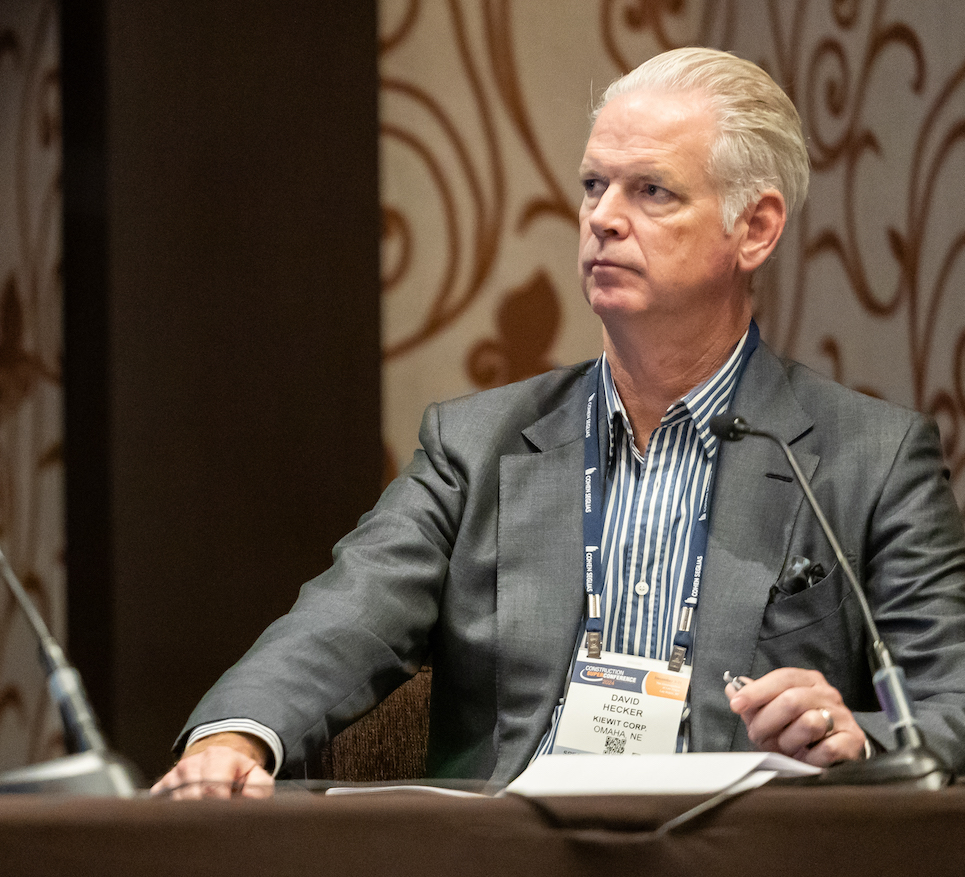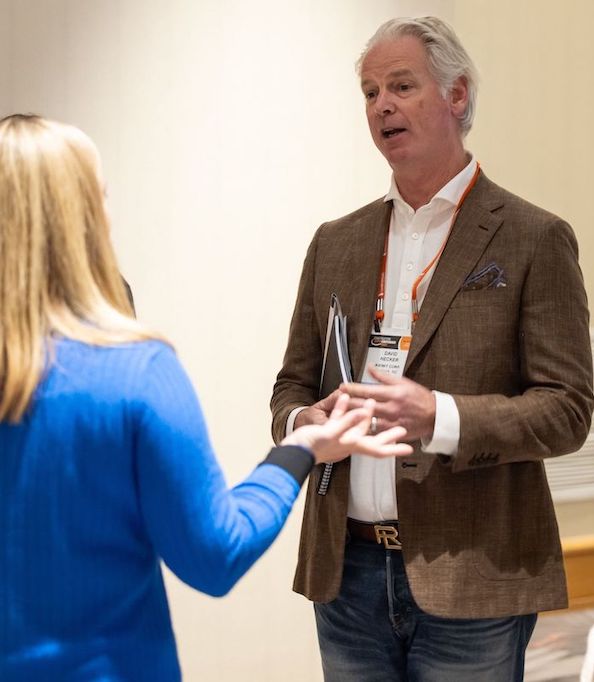OMAHA, NE – An attempt to circumvent a limitation of liability clause usually starts with an allegation that the contractor has been grossly negligent.
Considering that most high-dollar contracts are meticulously crafted, the gross negligence accusation is a bit of a long shot.
 Even with an admittedly low probability of success, David A. Hecker (pictured at CSC 2024), group general counsel at Kiewit Corp, Omaha, Neb., believes that attorneys should be aware of the strategy.
Even with an admittedly low probability of success, David A. Hecker (pictured at CSC 2024), group general counsel at Kiewit Corp, Omaha, Neb., believes that attorneys should be aware of the strategy.
Third Thursday sat down with Hecker, a CSC panelist and long-time attendee, to learn more about limitation of liability clauses and the tactics that are increasingly being used to get around those clauses.
Third Thursday: Why are limitation of liability causes so important?
Hecker: We sign contracts and we put in a number of mechanisms to limit our risk and limit our liability. Maybe we cap it at $100 million on risk. If an issue happens and the owner suffers a $200 million loss, he doesn’t want to be bound by the $100 million dollar limited liability. The owner may allege that the reason for this massive loss was that the contractor was grossly negligent. Even though we spent all this time negotiating a mutual limitation of liability, which caps risk—owners will not want to be bound by that—they’ll allege gross negligence.
Third Thursday: What are some of the relevant provisions?
Hecker: Limitations of liability can come in a number of forms. You can have a provision in your contract that says, ‘Under no circumstances will my liability to you exceed a dollar amount or a percentage of the contract value.’ Another provision can say, ‘We will not be liable to you for consequential damages.’ Any of those kinds of limitations can be set aside if you’re found to be grossly negligent. There’s a lot of nuance to responding to those kinds of claims. The principle is that alleging gross negligence is a way to get around contractually negotiated limitations.
Third Thursday: Why is gross negligence difficult to demonstrate?
Hecker: In the construction context, it’s not whether the bridge fell down, it’s about whether the work that you did met the requirements of the contract—or was grossly negligent. It’s not a question of degree. You’re either in breach or you’re not in breach. There’s a little bit of a disconnect between conflating this concept of gross negligence with the idea of terms that allow us to allocate risk.
Third Thursday: What are some specific cases?
Hecker: There’s an arbitration decision out there that went against Chicago Bridge and Iron [CBI]. It was essentially a $1 billion finding against them. They had a limitation of liability provision in their contract that limited their liability to roughly $80 million. The arbitration panel found that they were grossly negligent and allowed the owner claimant to recover the full value of their damages, which was roughly $800 million in breach. The result was CBI filing bankruptcy.
Third Thursday: Is this a relatively new phenomenon?
Hecker: This was not an issue that I saw 10 years ago ever. Now that CBI decision is out there, and we are routinely seeing that [gross negligence] allegation being included in claims, and it’s emboldening parties to pursue claims that historically they just would not have pursued because they would have evaluated it as having little merit.
Third Thursday: Why is this tactic becoming more common?
Hecker: Not only are people being more litigious and more aggressive in their positions, they’re alleging these theories as a way to really crank up the risk to a contractor. It’s as much to force settlements that are favorable to them—because the contractor just can’t risk a possibility of losing one of those cases. You take the whole business down, so you may end up paying more than you probably should to avoid that risk.
 Third Thursday: How difficult is it to demonstrate gross negligence?
Third Thursday: How difficult is it to demonstrate gross negligence?
Hecker: It’s commonly alleged, but very difficult to win the case. For most lawyers in the United States, it is a very high bar to find contractors grossly negligent. It’s going to be very difficult for a party to succeed in a claim of gross negligence. I can imagine a scenario where it would happen, but it would have to be egregious behavior by the contractor. It would not be a case where it was just a simple breach of agreement by the contractor, or an oversight or sloppiness. It would almost have to be sabotage to overcome these contractually negotiated provisions.
It’s more of a theoretical risk than a real risk. However, the numbers in this theoretical risk can be so huge that people are going to alter their behavior—and maybe overpay to settle cases to avoid the risk. You’re not going to find many cases where contractors are found to be grossly negligent, but people are going to keep trying to assert those claims because they might get a windfall by making that threat.
Third Thursday: Why do you continue to return to CSC?
Hecker: I would highlight the networking. It’s always great to see friends at CSC. I’m also always looking for people who can add value to our company, and that goes for colleagues and the vendors who set up their booth in the networking areas. If they have a skill set that we need, I’m very interested because we’re always looking for the next creative approach to solving a problem.

